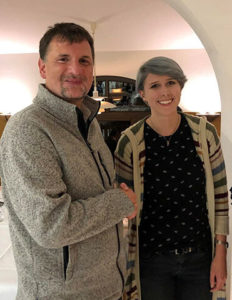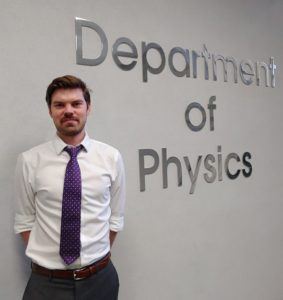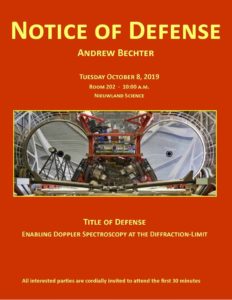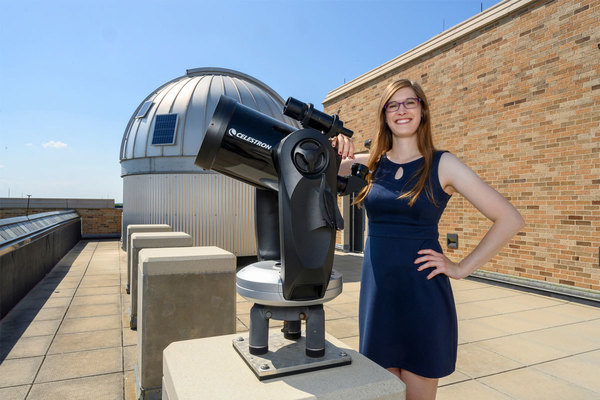
Check out Notre Dame Physics’ post about Erika here: https://physics.nd.edu/news/holmbeck-wins-award-at-the-nuclear-physics-in-astrophysics-conference-npa-ix/

Check out Notre Dame Physics’ post about Erika here: https://physics.nd.edu/news/holmbeck-wins-award-at-the-nuclear-physics-in-astrophysics-conference-npa-ix/



Check out Notre Dame College of Science’s post about our very own Michelle Berg here: https://science.nd.edu/news/physics-doctoral-student-receives-nasa-grant-to-study-galaxy-evolution/
 In high school, I scoffed at the idea of putting more effort into my humanities classes because I thought a smart person like me should pursue only the hardest subjects, and surely those were not them! In college, still interested in science but only pretending to have my priorities straight in a new world of opportunity, my scientific endeavor continued. I just wanted to do something challenging, without much thought as to why I was doing it.
In high school, I scoffed at the idea of putting more effort into my humanities classes because I thought a smart person like me should pursue only the hardest subjects, and surely those were not them! In college, still interested in science but only pretending to have my priorities straight in a new world of opportunity, my scientific endeavor continued. I just wanted to do something challenging, without much thought as to why I was doing it.
Notre Dame physics made sense given my background, but the program has ultimately steered me away from the thing I ostensibly came here to do and altered my course in ways I never anticipated. My advisor, Maxime Brodeur, has been every bit the positive mentor one could hope to have in graduate school and that I was searching for during my second year. And my project, a two-pronged approach to measuring exotic atomic masses of relevance to the astrophysical rapid neutron capture (r) process through instrument development and Penning trap mass spectrometry, has been (mostly) captivating and rewarding. But I’ve realized now in my fifth year that it’s not so much doing science that I enjoy, but communicating its significance. Given that I think everyone should regard science’s methodology and culture as highly as I do, I want to work as its advocate to promote scientific thinking in areas beyond fundamental research.
After graduating and hopefully whiling away at least some of the six-month grace period before my undergraduate student loans come due, I’ll make myself useful somewhere between those doing research of the type I will have left behind and those in government who have to confront its findings.

Gary Uppal is a fourth year working with Dervis Vural. Gary’s research mainly involves population dynamics and understanding how cooperation might evolve in biological systems. The evolution of cooperation is still an active area of research, since social systems are always susceptible to exploitation by cheaters. In particular, he has been studying the effects of fluid dynamical forces on the social evolution of microbes. Originally from California, Gary did his undergrad at UC Davis. He first wanted to go into astronomy after reading a book on the solar system in the third grade, and later changed his interests to high energy physics and then to statistical physics. He enjoys collecting – and occasionally reading – books, traveling, live music, practicing meditation, and spending time with family and friends. After graduation, he wants to find a job either in academia or industry where he can continue to do research and continue to learn.
 Michael is a seventh year graduate student working for Professor Colin Jessop. He spent a few years measuring the properties of the Higgs boson through its decay into two photons as measured by the Compact Muon Solenoid (CMS) at the Large Hadron Collider. He also spent a few years working on the Electromagnetic Calorimeter for the CMS. This impressive assembly of crystal and electronics allows for precise measurement of photon and electron energy in the CMS and is especially important for the analysis that Michael performs. He chose to work with Prof. Jessop and the CMS detector because they use cutting edge technology and analysis techniques. Michael spent the last 4 years living in France and working at CERN in Switzerland. He enjoys swimming, playing card/board/video games, and helping out at his family farm in Minnesota. After graduating from the University of Notre Dame, Michael plans to move into industry where he hopes to continue developing new hardware and innovative analysis techniques.
Michael is a seventh year graduate student working for Professor Colin Jessop. He spent a few years measuring the properties of the Higgs boson through its decay into two photons as measured by the Compact Muon Solenoid (CMS) at the Large Hadron Collider. He also spent a few years working on the Electromagnetic Calorimeter for the CMS. This impressive assembly of crystal and electronics allows for precise measurement of photon and electron energy in the CMS and is especially important for the analysis that Michael performs. He chose to work with Prof. Jessop and the CMS detector because they use cutting edge technology and analysis techniques. Michael spent the last 4 years living in France and working at CERN in Switzerland. He enjoys swimming, playing card/board/video games, and helping out at his family farm in Minnesota. After graduating from the University of Notre Dame, Michael plans to move into industry where he hopes to continue developing new hardware and innovative analysis techniques.
 Nirupama is a third year working with Umesh Garg in the Experimental Nuclear Physics division. She uses gamma spectroscopy to study the exotic phenomena exhibited by triaxial nuclei. She is currently investigating the rare process of wobbling in triaxial nuclei in A~130 region as well as looking for different regions in the nuclear chart where triaxiality (and hence wobbling) is expected. Nirupama came to the University of Notre Dame from India, but has never felt out of place thanks to the friendly and helpful atmosphere. One of her most exciting accomplishments thus far includes selection for the 2017 cohort of the NSF sponsored training program Social Responsibilities of Researchers (SRR) in the Reilly Center. As a part of SRR, she will design a website to introduce the non-science population to the basic applications of Nuclear physics.
Nirupama is a third year working with Umesh Garg in the Experimental Nuclear Physics division. She uses gamma spectroscopy to study the exotic phenomena exhibited by triaxial nuclei. She is currently investigating the rare process of wobbling in triaxial nuclei in A~130 region as well as looking for different regions in the nuclear chart where triaxiality (and hence wobbling) is expected. Nirupama came to the University of Notre Dame from India, but has never felt out of place thanks to the friendly and helpful atmosphere. One of her most exciting accomplishments thus far includes selection for the 2017 cohort of the NSF sponsored training program Social Responsibilities of Researchers (SRR) in the Reilly Center. As a part of SRR, she will design a website to introduce the non-science population to the basic applications of Nuclear physics.

Jason is a seventh year working with Peter Garnavich. His research strives to better understand the characteristics of isolated galaxies in underdense regions of the universe and how they compare to galaxies in higher density regions. He previously worked at American Museum of Natural History (AMNH) with Dr. Neil deGrasse Tyson. Jason is a self-proclaimed “science fiction enthusiast,” so much so that he sometimes trips over all his books. Upon graduating from the University of Notre Dame, he is looking forward to continuing his research as a Post-Doc.